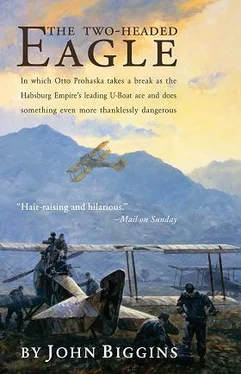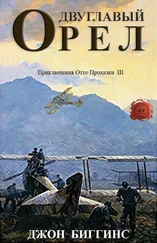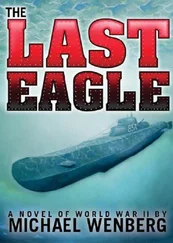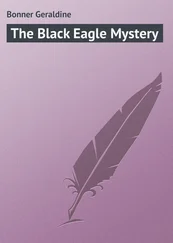“The flight, Herr Leutnant?” He looked puzzled. Was the man deliberately trying to annoy me, I wondered, or was he really as out of touch with events as he seemed?
“The flight, Herr Kommandant: the flight over Palmanova tomorrow morning to take photographs for Army HQ. Surely you remember.”
“Oh yes, of course, that flight. But why should you wish to discuss it with Toth, for goodness’ sake?”
“I obediently report, Herr Kommandant, that Zugsfuhrer Toth is to fly me there and back tomorrow. I wished to outline to him the purpose of the mission, to show him the route we might take and to ask for his views on it.”
He paused for some time and looked at me in bewilderment. “Herr Leutnant,” he said at last, “Herr Leutnant, do my ears deceive me or are you seriously suggesting that you, an Austrian officer, should discuss your plans with a ranker? ”
“Why of course, Herr Kommandant: it seemed to me the merest common sense to tell the man what we are setting out to do and work out with him the best way of doing it. After all, I am not just a newcomer to the Fliegertruppe but to the South-West Front as well. Toth has been here several months I believe and has crossed the Italian lines on numerous occasions, so he should know better than most people what the hazards are and the best way around them.”
“Herr Linienschiffsleutnant” (he always used the cumbersome full form of my rank when he wished to annoy me), “Herr Linienschiffsleutnant, while I cannot say what the custom is in these matters in the Imperial and Royal U-Boat Service—for all I know you may take it in turns with the cook to command your ship—in the k.u.k. Fliegertruppe the regulations are quite specific: the officer-observer is there to give the orders and the ranker-pilot is there to carry them out, even if he is ordered to dive at full speed into the ground. Toth has neither the right to his own opinion in the matter, nor any need to have one. He does not need to know where to go because you will direct him. And you will direct him because you are an officer and that is what officers are for, is that clear? ”
I discussed this conversation with Meyerhofer after supper.
“Yes I know,” he said, “stupid way to run an air force if you ask me. But I warn you, watch out for Toth: that man’s got a mind of his own and he’s done for one officer-observer already.”
“Who was that then? ”
“A fellow called Rosenbaum, at the end of May, over Gorz. Seems that Toth was manoeuvring the Brandenburger—your Zoska—a bit abruptly to dodge a Nieuport and Rosenbaum just fell out. He dropped through the conservatory roof of a convent you know—just missed a nun who was watering her begonias. Funny thing, but you’d have expected him to have splattered like a Roman candle, what with just having fallen from two thousand metres, but when they picked him up there was scarcely a mark on him. Anyway, there was no end of a row about that: seems that Toth had just done a bunt-turn and flicked him out of the cockpit.”
I should point out here that a bunt-turn is rather like performing a loop, except down rather than up, so that the pilot is on the outside of the loop, not the inside. It is still a court-martial offence I believe in all the world’s air forces because of the brutal strains that it places upon an airframe.
“How did Toth get off?” I enquired.
“Luck. On the way home he met an SP2 artillery spotter. They’re an Italian-built Farman pusher: you’ll see a lot of them before you’ve been here long. I pity the poor buggers who have to go up in them because they’re quite helpless when attacked: more blind spots than you’d think possible. Anyway, Toth decided not to shoot this one down, just got under its tail and kept tormenting it: nudging the tail down when the pilot tried to dive and bumping it underneath when he tried to climb and generally chivvying the poor sod around, further and further from home, until he ran out of petrol and had to land at Sesana. I gather that the observer was really cut up about it—the Principe Umberto di Cariagnano della Novera or something: really posh cavalry-regiment type. Said that he’d been forced down by unfair means—presumably it would have been all right if Toth had just shot him—and demanded immediate repatriation under a flag of truce. Then he got a look at Toth, who’d just landed alongside, and that really did it: carried on like a lunatic about him, a nobleman, being forced down by a “trained orang-utang,” as he put it.”
“What happened then?”
“Oh, Toth just lost his temper and walked over and caught him a beauty under the chin—knocked him clean out. Of course, there was no end of a row about that: a ranker punching an officer and a nobleman into the bargain, especially after he’d just lost an officer of his own. They disallowed him the victory, then Kraliczek stepped in threatening court martials. In the end, rather than lose a pilot for a month in the cells, they gave him eight hours tied to the stake. We said that Kraliczek couldn’t, but Kraliczek knows his regulations and pointed out that Toth’s only a titular sergeant and therefore he’s as liable to corporal punishments as a junior NCO when on active service. I tell you, though, it went down very badly here, to see a fine pilot like that standing for eight hours in the sun with his wrists tied above his head like a Ruthenian ploughboy who hadn’t bothered to clean his rifle.”
This left me very sad and (I confess) not a little apprehensive. The k.u.k. Armee was not alone in 1916 in having a range of humiliating field punishments. I understand that the British Army of the day made a habit of leaving defaulters lashed to wagon wheels for hours on end. But to apply them to a sergeant-pilot in a front-line unit seemed to be going too far. Toth had tipped out one officer already by accident. Might the next one perhaps not fall to his death by design?
Later in the evening, before I turned in for the night, I spoke with the young Hungarian lieutenant Barinkai.
“Oh yes,” he said in his lisping Magyar-German, “Toth, yes, I haven’t spoken much with the man but I believe he transferred from a Honved sapper unit. From what I can gather it seems that he was once a monk, believe it or not; or rather a seminarist, in the abbey at Esztergom. I believe they threw him out after they caught him on top of a nun in the abbot’s marrowbed. Luckily for him it was the week of Sarajevo, so he just came into the Army and no questions asked. Funny really how the war worked out like that for some people. I’d just ploughed my Matura second time around, and I’d borrowed a lot of money for cards and there was a housemaid being troublesome about a kid she said was mine. Then suddenly hey presto! war declared, into uniform and goodbye exams, goodbye debts, goodbye housemaids for the duration. The papers say that this war’s a disaster for the human race. All I can say is, blow the human race: for Feri Barinkai it couldn’t have come at a better time.”
Oberleutnant Schraffl and I were up and dressed at eight bells—sorry, 0400 hours—next morning, wakened by our shared soldier-servant Petrescu. Petrescu was an illiterate Romanian peasant from near Klausenburg in Transylvania—my wife’s birthplace—and we had been introduced only the day before. His eyes had widened with wonder when he saw me standing with Schraffl. I had been wearing my blue naval jacket with field-grey breeches and puttees, and I later discovered that within a couple of hours he had broadcast it about the entire district that I was a British officer—the son of the English King no less—whom “der Herr Lejtnant Schraffl” had just shot down and was holding prisoner until a ransom could be paid: a harmless enough yarn I suppose, except that the following week, while I was out for an evening stroll, a posse of rustics armed with pitchforks surrounded me and sent for the village gendarme in the belief that I was trying to escape.
Читать дальше












